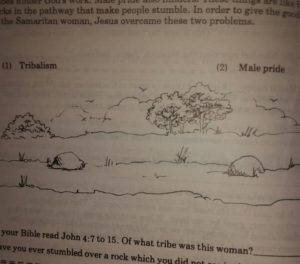
“See this stone in the path? Now this one too, here in the picture on the same trail. . .”
I sat with half a dozen men, some a decade or more older than me. The hut we gathered in each week was roofed with long grass. The floor consisted of smooth, hardened dirt. A semicircle of dark benches carried our weight and were worn smooth, long sense having yielded up their last dangling splinter. It was Thursday and one of this week’s T.E.E. lessons focused on a visit Jesus had with a woman at a water well.
Mature, practical, sincere, the upcountry pastors and elders took in the illustration on the workbook’s open page. The image struck a chord. Two stumbling-stones, one representing male pride, the other, tribalism. The students had read the lesson’s introduction:
Here a woman of a different tribe met Jesus. Sometimes we let the division of tribes hinder God’s work. Male pride also hinders. These things are like big rocks in the pathway that make people stumble. In order to give the good news to the woman, Jesus overcame these two problems.
I reviewed the scene with the men.
“See the person Jesus found at the well. She not only was a woman. She also spoke with an accent. We know this because she was of a different tribe, another people.”
I look in the face of each man in our semi-circle.
“Can one of you describe this picture for us. Can you help the rest of us see what good thing Jesus wanted bring to the woman and what Jesus did to overcome two big problems so she could be helped.”
A pastor nodded. He launched in, reviewing the narrative, raising the matter of how women are often looked down upon, mistreated. The room was quiet. The pastor then spoke of hard issues related to tribalism, the challenges to go beyond it, as Jesus did.
“Can we trust the Lord is among us today? To help us to change?”
Heads nod. Confession is voiced by two or three. We pray.
Then go our ways, trusting him, friend of sinners, to lead.
© 2017 Jerry Lout


